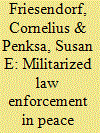| Srl | Item |
| 1 |
ID:
141442


|
|
|
|
|
| Summary/Abstract |
This article will work towards a multi-level collective action approach for understanding the deployment of Common Security and Defence Policy (CSDP) military operations. It is multi-level because it uses three levels of analysis: firstly, the international level, where events that create threats to certain values catalyze the process leading to the deployment of an operation; secondly, the national level, where EU governments formulate their national preferences towards prospective deployments based on utility expectations; and thirdly, the EU level, where EU member states negotiate and seek compromises to accommodate their different national preferences. The strength of the model will be demonstrated through empirical case studies on the deployment processes of EUFOR Althea in Bosnia and Herzegovina and EU NAVFOR Atalanta off the coast of Somalia. The article will also provide an overview of the existing theoretical literature on the deployment of CSDP military operations.
|
|
|
|
|
|
|
|
|
|
|
|
|
|
|
|
| 2 |
ID:
084587


|
|
|
|
|
| Publication |
2008.
|
| Summary/Abstract |
The militarization of law enforcement has been a major feature of post-cold war international security: domestically, at borders and as part of peace operations. In post-war interventions, international military forces are confronted with tasks ranging from crowd and riot control and the arrest of suspect war criminals to the fight against organized crime. This article analyses and explains the militarization of law enforcement in Bosnia and Herzegovina, with a focus on the European Union Force (EUFOR). After taking over from NATO's Stabilization Force (SFOR), which had gradually and reluctantly become involved in law enforcement, EUFOR expanded counter-crime efforts. In its second term, EUFOR scaled down such engagement. We explain these dynamics by pointing to three interrelated factors: the role of individuals, the evolution of regional institutions and changing perceptions of crime and the rule of law.
|
|
|
|
|
|
|
|
|
|
|
|
|
|
|
|